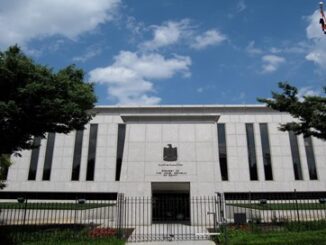
US Senator Chris Murphy has explained to the Senate why the Biden administration should withhold aid to the Egyptian government over significant human rights abuses.
“Has Egypt made significant progress on human rights? “Of those 2,954 [known political] detainees, the [Egyptian] government released 49. That’s not clear and consistent progress,” said Sen. Christ Murphy.
“Congress has also tied an additional $225 million of Egypt’s military aid to ‘sustained and effective steps’ in improving Egypt’s human rights record…The record is overwhelmingly clear that things in Egypt have gotten worse on these fronts, not better, over the last year.”
“Ally of the United States, you shouldn’t lock people up for political speech,” said Murphy, addressing Egyptian government.
Every year the US hands over $1.3 billion in military aid to Egypt though $300 million is conditioned on Egypt adhering to certain human rights conditions.
According to a waiver, the $300 million can be waived on national security grounds and almost every year it has been waived.
Murphy, an outspoken critic of Egypt’s treatment of political prisoners, is urging the American government to withhold the full $300 million.
Last year Murphy said he was “disappointed” when the Biden administration sent a portion of security assistance to Egypt despite the congressionally-mandated human rights conditions attached to the money.
“I made the case then that we had an opportunity to stand up strongly for democracy by holding back military aid – making it clear to present and future dictators that if you violate human rights,
you will no longer receive a blank cheque from the United States of America,” the senator said in a statement in January this year.
Rights groups have, for months, been calling on US officials to withhold the portion conditioned on releasing political prisoners and allowing them due process.
In August 20 human rights organisations signed a letter to US Secretary of State Antony Blinken and Assistant to the President for National Security Affairs Jake Sullivan to say that the Egyptian government has failed “to meet the congressionally mandated human rights conditions.”
“Providing this additional military aid to Egypt in these circumstances would contradict the frequent pledges from the Biden administration to put human rights at the center of US foreign policy, including specifically its relationship with Egypt,” the letter went on to say.
There are roughly 60,000 political prisoners in Egypt who are regularly denied medical care and tortured systematically, sometimes to the point of death.
Here is the full transcription of Senator Chris Murphy’s word at the US Senate:
Madam president, Egypt is one of America’s closest allies. Our taxpayers send them more direct funding for their military than we send almost any other nation in the world. But here’s what happens to politic opponents of the Egyptian regime when they get arrested and they get arrested at a dizzying rate. Arrivals there are blindfolded and then forced to run through a human corridor of guards who pummel them with sticks until they collapse.
Following this initiation for political prisoners, many are routinely beaten and tortured for months on end, often with no formal charges being filed. Some never make it out alive. Human rights groups estimate that there are around 60,000 political prisoners in Egypt. I get it that big numbers sometimes lose their meaning in this place, but by comparison, estimates are that Russia has 420, China likely has around 1,000, Egypt locks up 60,000 political opponents of the regime.
To keep up with the demand of the imprisonment spree, they have had to build 60 new detention centers. They house some of the country’s most prominent human rights defenders, journalists, and ordinary people locked up for years because they attended a protest or recorded a TikTok video. Let me tell you the story of one of these 60,000 people. One of my constituents is suffering through the pain and uncertainty of having a relative unjustly imprisoned in Egypt. His father was imprisoned and rearrested and disappeared in June of 2020.
According to the U.N., his detention seems, quote, to constitute an act of reprisal against the doctor for documenting cases of enforced disappearances for the special procedures of the human rights council of the united nations. He has endured abuse that resulted in broken ribs and other significant injures. His abuse included rape, electrocution, threats to — electrocution, threats to rape his wife and physical abuse while blindfolded. Since the president of Egypt came to power in 2013, more than 1,000 people have died in Egyptian custody.
More than 70 % are because of a denial of health care. This isn’t an adversary of the united states. This is Egypt. Our ally, and every day that we continue to send billions of dollars to the Egyptian government, while paying lip service to these egregious human rights violations, it is a blow to our nation’s character and credibility around the world. For the last several years i fought to change our Egypt policy. For the first time in fiscal year 2022, we conditioned with no waiver $ 75 million of their military aid package on making clear and consistent progress on providing detainees with due process of law. Because there is no waiver, they have to certify that Egypt has made the progress or they haven’t made that progress and withhold the money. The record is clear that they have not.
Let me provide one way of measuring clear and consistent progress on releasing political prisoners, a group of Egyptian human rights organizations submitted a list of 2,954 of known political prisoners. These are people who should not be in jail. They protested the government. And if you’re going to be an ally of the united states, you shouldn’t lock people up for political speech. But of those 2,954 detainees, the government released 49. That’s not clear and consistent progress.
Another metric, since April, Egypt’s terrorism courts released 417 prisoners, but over the same time period, 4,400 have had their time renewed by the court. That is not clear progress. It’s progress, but it’s always one step forward or two or three steps backwards. Egypt has not made the kind of progress required to merit the release of $ 75 million. In addition to that, congress has tied an additional $ 225 million of Egypt’s military aid to sustained and effective steps in approving Egypt’s human rights records, a broader record of human rights abuses.
Egypt needs to allow NGO’s and the media to operate, and investigate and prosecute the cases of forced disappearances. Again, the record is overwhelmingly clear that things in Egypt have gotten worse on these fronts, not better over the last year. Journalists are regularly still charged with joining a terrorist group or spreading false news for any critical reporting. Just last week four journalists from the independent outlet with charged with a single news article that documented corruption within a political party close to Sisi.
Earlier this year, human rights lawyer was charged with inciting terrorism after he wrote a social media post denouncing prison conditions. Egypt is also not content with imprisoning its critics at home, but increasingly it’s pursuing its critics abroad. News reports emerged in December that a prominent opposition leader, who lives in exile in turkey, had his phone hacked with NSO group software.
In January, the U.S. justice department arrested a foreign agent here, acting on behalf of Egypt. This is not the behavior of a foreign government that made significant progress to improve human rights to merit the release of $ 225 million. Lastly, every year we have this debate there are proponents who argue that even though Egypt has this horrific human rights record, we should give them money anyway.
The argument is that because Egypt is a really important strategic ally if we withhold a portion of the $ 1.3 billion, the Egyptians might stop cooperating with us or shop around for another partner. Let me take a minute to address the fallacy of this course, the Egyptians were angry. It probably made our diplomats’ life harder in Egypt. Our relationship didn’t change. Even in operations they still cooperated with us on counterterrorism. They provided a Suez and overflight access. They again facilitated a truce in Gaza. Why?
Because all of these areas in which we engage are beneficial for the Egyptians. They don’t do it as simple payback for the aid. They engage with us on these issues, engage with Israel, because it’s good for Egyptian security. Notwithstanding whether they get $ 1 billion or $ 1.3 billion from the united states. We also sent a signal to the Egyptians by withholding some of that money last year. While we didn’t see significant improvement, we did see some political prisoners released. This year we have to keep the pressure up. The united states needs not just to talk the talk when it comes to human rights abroad. We need to be able to walk the walk as well.
And the decision that the administration will make this week as to whether to comply with the conditions set forth by congress on holding the Egyptians accountable for progress on human rights is critical to American credibility globally when it comes to our call to protect human rights and democracy abroad.
For that reason, I would urge the administration to withhold needs not just to talk the talk when it comes to human rights abroad. We need to be able to walk the walk as well. And the decision that the administration will make this week as to whether to comply with the conditions set forth by congress on holding the Egyptians accountable for progress on human rights is critical to American credibility globally when it comes to our call to protect human rights and democracy abroad. For that reason, i would urge the administration to withhold the full $ 300 million as called for by the appropriations act, until Egypt’s record gets better. I yield the floor.



